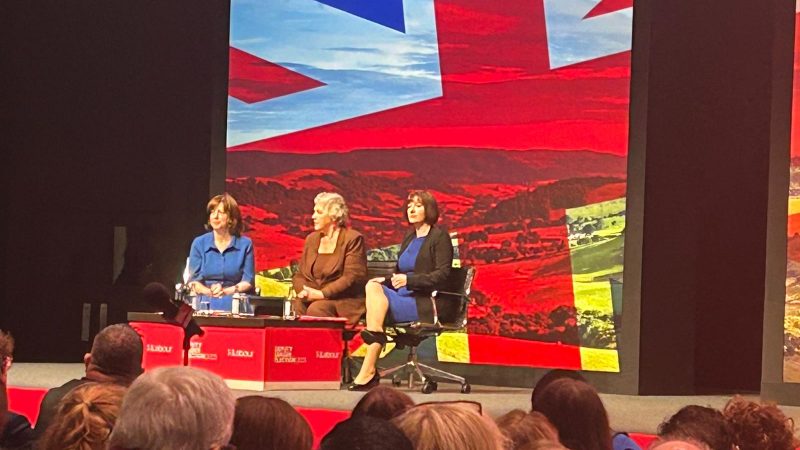
After the formal business of conference closed, many delegates hung back to hear the respective pitches of the two candidates running to be Labour’s Deputy Leader, Bridget Phillipson and Lucy Powell.
The event was chaired by Labour Women’s Network’s Nan Sloan who imposed strict rules that were – largely – followed by both candidates. Questions had been submitted in advance by members and those who were in the hall were able to ask them in person, with others read by the chair.
The questions were not on areas of policy difference but on those of emphasis, approach, campaigning style and party management.
The candidates were asked how they would work with a range of key Labour audiences including the unions, socialist societies, members campaigning in the local government, Scottish and Welsh elections next year and CLPs who aren’t represented by a Labour MP.
When discussing the Senedd elections, Powell’s response was the punchier of the two. Philliopson spoke of her dedication to campaigning in the elections, but Powell went further in her analysis saying “What we’re seeing in Wales is a real example of what we’re seeing elsewhere, which is the fracturing of our voter coalition, the fracturing of the electorate.” She went on to add “that’s why we need to reunite our voter coalition with that really strong, compelling story about what we think is really wrong with this country and how we’re going to fix it.”
In her harshest critique of the leadership, Powell criticised the ‘group think she suggests is at the heart of some of the government’s problems, saying “when you have a kind of increasing groupthink of fewer and fewer people taking decisions that are not connected to the communities that we represent, and are not hearing that feedback on the doorstep.” She has promised to be a bridge between the members and the government and “tell truth to power.”
Subscribe here to our daily newsletter roundup of Labour news, analysis and comment– and follow us on Bluesky, WhatsApp, X and Facebook.
Powell made the most of having more free rein to talk about Labour’s errors in government (including the Winter Fuel Allowance and Welfare Reform Bill) which carried a fair amount of criticism of such mistakes – and, by implication, those making them. Meanwhile, Phillipson leaned more into campaigning positively on the things Labour are achieving in government – with particular emphasis on what she has delivered for children and families including – arguing that Labour should be focused on what Labour is doing to improve people’s lives.
Phillipson’s fieriest moment came when asked about how to defeat the Green Party. Here Powell returned to her theme of reuniting Labour’s electoral coalition. But Phillipson went much further saying “what do they [the Greens] do? They oppose infrastructure projects. They oppose the investment that will make a huge difference to our communities and to tackling climate change.So we’ve got to be as ruthless in taking the fight to them as we are in taking the fight to be to Reform.”
On Reform, both candidates used the formulation “We can’t outReform, Reform” which will please Labour members who have felt in recent weeks that the party has – until this conference – been too timid to standing up to the hard right party and too muddled in its messaging on where Labour’s red lines are – and aren’t – on immigration.
When asked what Labour’s greatest achievement was (excluding the NHS to make the question more interesting!) both candidates agreed it was the National Minimum Wage.
In their final speech to the room and members watching online, the differences in the two candidates approach was clear.
Powell described herself as having previously been a ‘shop steward’ for the PLP as Leader of the House of Commons. Her pitch is now to extend this role as Deputy Leader to being a voice for the membership as their ‘shop steward’.
Phillipson’s summing up held the strongest attempt to inject some difference between the two – and by implication criticism of the offer Powell is making. She said that members could choose to push our government to be bolder, to go further, to do more, with me as your voice at the cabinet table. Or you can choose division and disunity that fills the pages of the rightwing papers and puts us back on the road to opposition.”
In a week that has been as much about the Labour Party finding its campaigning muscles again and emphasising common ground, this generally polite hustings (with it’s subtle undertones of unity vs dissent) was, in many ways, a fitting end of the 2025 Labour party conference in Liverpool.
-
- SHARE: If you have anything to share that we should be looking into or publishing about this story – or any other topic involving Labour– contact us (strictly anonymously if you wish) at [email protected].
- SUBSCRIBE: Sign up to LabourList’s morning email here for the best briefing on everything Labour, every weekday morning.
- DONATE: If you value our work, please chip in a few pounds a week and become one of our supporters, helping sustain and expand our coverage.
- PARTNER: If you or your organisation might be interested in partnering with us on sponsored events or projects, email [email protected].
- ADVERTISE: If your organisation would like to advertise or run sponsored pieces on LabourList‘s daily newsletter or website, contact our exclusive ad partners Total Politics at [email protected].




More from LabourList
‘Labour’s quiet quest for democratic renewal’
‘Labour promised to make work pay. Now it must deliver for young people’
‘Council Tax shouldn’t punish those who have the least or those we owe the most’